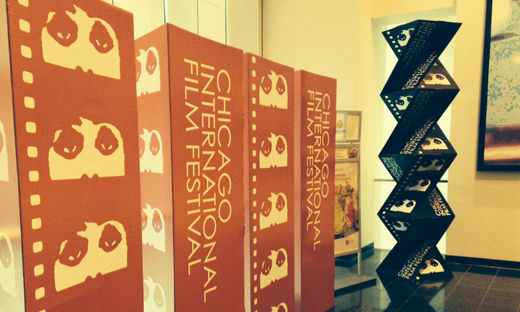
One of the most inspiring labor films in many years, Pride, which premiered at the Toronto International Film Festival, was not shown at the Chicago Film Festival because it is now in commercial release across the country. Reminiscent of the great labor classics, Made in Dagenham, Brassed Off, and Norma Rae, the story tells of the unique coming together of the labor and gay rights struggles, and takes place in England in 1984 when Margaret Thatcher was out to destroy both groups. The totally uplifting and life-affirming script is supported by a powerful political music soundtrack that includes Paul Robeson singing about the Welsh miners, and Billy Bragg’s “Power in the Union” pumping over the closing credits.
Although there were some complaints that no Welsh actors were used in a film about Welsh workers, the real-life characters are brought to life on the big screen in all their glory with some magnificent acting. Especially Mark Ashton, the young activist who started Lesbians and Gays Supporting Miners (LGSM), who was determined to fight for solidarity between the two traditionally antagonistic groups. Tragically his struggle ended at 26 years of age from an AIDS death. It’s a film that makes you laugh and cry, feel the beauty of life and be inspired to continue the struggle. Yes, the miners lost the strike and were forced back to work, but the movie ends on a powerful high note showing scenes of masses of activists, gays and workers uniting in struggles around the world.
A re-run of the 2007 film, Comedy of Power by prolific French director Claude Chabrol, and starring the famed actress Isabelle Huppert as a magistrate going after a corrupt CEO, was shown at the Chicago Festival as part of a tribute to the great actress. It screened at one of Chicago’s oldest, most splendid film houses, The Music Box, which hosts many great independent films throughout the year. Although the film’s theme has potential intrigue, the pacing and script are low key and fail to involve the viewer in an exposé of corporate abuse. It’s treated more as a personal vendetta by a judge dealing with marital and physical issues while stalking a CEO who misuses public funds. Despite the powerful names involved in the project, there are many other films, including documentaries, which address corporate power and abuse more urgently and dramatically.
Another couple of honored French filmmakers, the brothers Jean-Pierre and Luc Dardenne (Rosetta, The Son), known for their humanist treatments of working people in trouble, presented their latest cinematic award-winning achievement, Two Days, One Night. The simple and predictable plot, in much the same style as their previous films, follows a young woman who was voted out of her job by workers who were cynically given the option by their boss of getting a bonus rather than have her return to work after a long sick leave. Fighting to save her job, she is given the weekend to try to persuade her fellow workers in her small shop to vote her back on the job. She calls and visits each of the 12 workers, finding out their reasons why they voted one way or the other. The film is based on these interactions. In a time of economic hardships, many of the workers voted to get the much needed extra pay, while others based their decisions on more personal reasons. It’s a well executed human drama, rightly winning many awards, including Best Film at the Sydney Film Festival. But like most labor films made in capitalist countries, the option of organizing for collective action is usually overlooked, unions are rarely mentioned, and a class analysis is nowhere to be seen.
One of the most intriguing film descriptions at the Festival was for a movie called Joy of Man’s Desiring, described as a poetic meditation on work by Québécois director, Denis Coté. It was a minimalist “exercise in freedom from big budget films,” as the director put it in a Q&A after the screening. Shot for $30,000 in 3 weeks at 3 or 4 small factories around Montreal, the film consists of static shots of workers on machines, at lunch, and basically standing around. Simply showing the rhythms and repetitive movements of the machines and the production line, accompanied by some impersonal metal music, the director added sparse carefully written dialogue for a few of the workers – nothing they necessarily would have said themselves. Even signs on the walls of the shops are concocted by the director, mostly politically meaningless slogans. The factories chosen are small, no unions involved, no work issues addressed, simply visuals of impersonal machines being controlled by seemingly robotic people. The director’s intent was to not be subjective, but to be free of ideology or personal opinion, if that’s even possible. Esoteric, meaningless visual exercise for art’s sake. Almost as exciting as watching metal rust.
The film goes nowhere, as did the discussion with the director, who said that at first workers were reluctant. This would seem expected, since he came from nowhere, with little experience or sympathy for the worker, and described a film to them that would simply show machines and workers moving. They seriously questioned his motivation. In the director’s own words: “I tried to make a film without a message, without a position, strictly objective about the workplace and workers.” It might have been good therapy for the director, burdened with making big budget films, but he missed a great opportunity to make a point, rather than a pointless film.
There were many great films at the Chicago festival that were reviewed in previous festival reports, such as The Imitation Game, Timbuktu, Look of Silence, and many others I didn’t get to see. There were several great bio docs about formidable persons in the arts. Gian Luigi Randi: Life, Cinema, Passion, is a fascinating documentary about the history of Italian cinema through the experiences of someone responsible for the success of many great films. 92 year-old Randi is an historian, critic and director of the prestigious Venice and Rome Film Festivals for many decades, chumming with legends of the film world and promoting the best in world cinema. Another writer responsible for two classic books that were turned into blockbuster films (but who took no credit for the screenplays), Walk on the Wild Side and Man with the Golden Arm, is the Chicago writer Nelson Algren. In the doc Algren, we learn of this working-class writer who actually lived among the downtrodden people he wrote about – pimps, prostitutes, alcoholics, drug addicts, and other fascinating characters who enriched his novels. His writings attracted existentialist philosopher Simone de Beauvoir, lover and partner of the French philosopher Jean Paul Sartre, who shared her love with Algren for many years while living in Chicago. Algren’s uncanny ability to capture the pulse of the underclass in his writing and his revulsion of the establishment, ended with his relative obscurity as a sadly underappreciated artist. This engrossing film helps set the story straight.
I’d like to conclude with one of the most magical documentaries in recent memory. It reminded me once again how cinema has the power to capture the essence and wonder of life as it’s juggled around in the creative, fertile mind of a visionary artist, delivered onto the screen as a work of art for the world to see and use in all its power and glory, and often for the enrichment and betterment of the people. As we activists strive to make a better world, many by utilizing the arts, in cinema we can always turn to no better craftsman and visionary than the great Orson Welles. Dedicating his entire life to the power and advancement of film and theater, Welles provided us one of the richest bodies of cinematic art available. Chuck Workman, known for creating the beautifully stylized video montages at the Oscar Awards, has crafted a tribute to Orson Welles and his commitment to the art of cinema. The Magician: The Astonishing Life and Work of Orson Welles is just that – a recognition of the genius of a man who was a magician, an actor, theater director, filmmaker and progressive. His Citizen Kane has been considered by many critics and film lovers as the greatest movie ever made, followed by his stunning The Magnificent Ambersons.
But this documentary reminds us of all the other great projects he was involved in. It follows his life from childhood through the many tumultuous events that shaped this giant of cinema; his many appearances on talk shows; the many films he was forced to work in as an actor to help pay for his personal film projects, many of which were never completed in his lifetime; the film projects that were taken from him and deformed by company hacks; the many loves of his life and the many friends and associates who share rich experiences about the man who symbolized the highest quality of filmmaking. But Welles was always quick to say, as a life’s lesson learned, that the goal is not “art for art’s sake.” There is much more meaning and purpose to cinema. There are many great progressive filmmakers, but it wouldn’t be a bad idea to go back and view all of just this one director’s offerings.












Comments